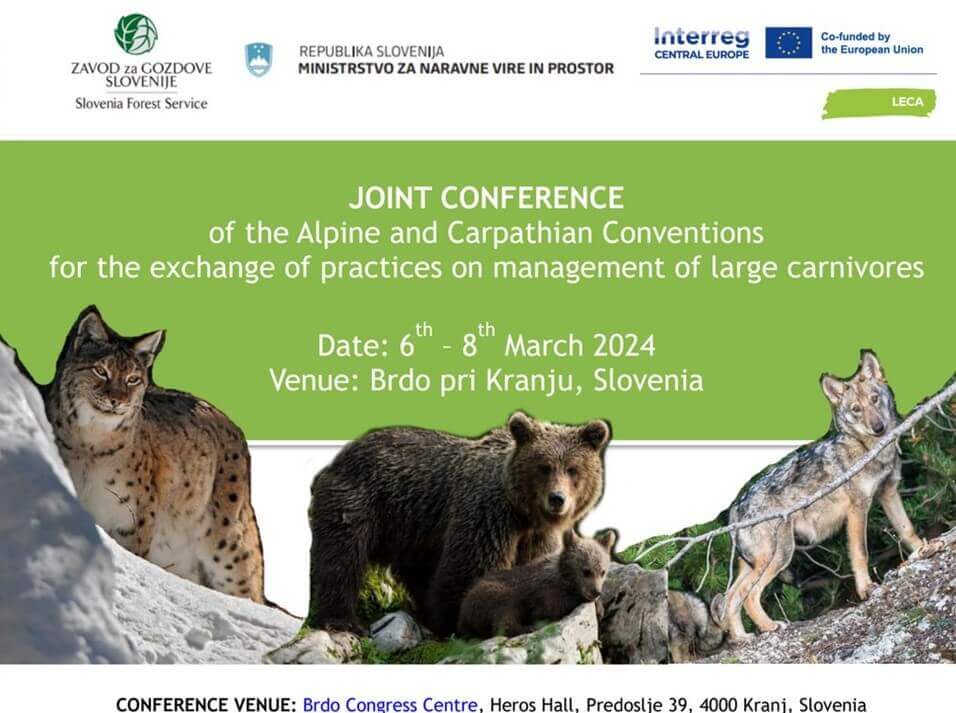A transboundary character of wildlife populations, such as large carnivores, require enhanced international collaboration for successful conservation and management solutions. As large carnivore populations are recovering in Europe, this is even more important to prevent and solve the challenges that arise.
For this purpose, an international conference focusing on large carnivore management took place in Slovenia between March 6 and 8, 2024. At the conference, representatives from 13 countries exchanged their experiences and solutions implemented within their countries. The conference was also a unique opportunity for policy experts to establish close cooperation in this field. The event was organised by Slovenia Forest Service in the scope of the Interreg Central Europe project LECA: Supporting the coexistence and conservation of Carpathian Large Carnivores. Both conventions, with support of the Slovenian Ministry of Natural Resources and Spatial Planning and the Ministry of the Environment of the Czech Republic, co-hosted the event.
The status of large carnivore populations, monitoring methods, spatial characteristics of their habitats, and the degree of interaction with humans and consequent conflicts vary between and within the countries and regions. “To this end, the conference aims to provide an overall picture of the status of large carnivore populations in the Alps and Carpathian Mountains,” explained Martin Duľa, coordinator of project LECA from Mendel University in Brno (Czech Republic). The LECA project goal is to produce guidelines on monitoring, conflict and poaching prevention of brown bear, grey wolf and Eurasian lynx. “This conference is the first event that aims to connect both the Alpine and Carpathian region with a view to share examples of good practice and discuss joint challenges,” added Eliška Rolfová, Chair of Carpathian Convention Working Group on Biodiversity, from the Ministry of the Environment of the Czech Republic.
The conservation of grey wolf, brown bear, and Eurasian lynx is subject to the same legal basis within the European Union, while policy practices in conservation management itself vary between countries. Rok Černe, Chair of Large Carnivores, Wild Ungulates and Society Working Group of the Alpine Convention from Slovenia Forest Service explains: “the conference focuses on exchanging experiences and revealing the differences in management practices at regional and national levels.” This established cooperation will contribute towards better understanding, and better conservation and management of large carnivores and associated societal challenges at the pan-European level.
Contact for further information: Martin Duľa, Department of Forest Ecology LDF MENDELU, +420 770 137 635, martin.dula@mendelu.cz


More news
-
The Horizon Europe project, Eurasian Network for Collaborative Research on Tree-Root-Mycorrhizal-Pathogen Interactions in Forest Soils (EuAsiaN-ROOT), coordinated by the Faculty of Forestry and Wood Technology, aims to provide a deeper…24. 6. 2025
-
Five Female Wolves Fitted with GPS Collars in the Beskydy and Javorníky…
Researchers from the Faculty of Forestry and Wood Technology at Mendel University in Brno have successfully captured and fitted GPS telemetry collars on five female wolves in the Beskydy and Javorníky Mountains over the past two years. These…28. 5. 2025 -
FFWT launches unique data collection on forest ecosystem functioning in MENDELU…
The Department of Forest Ecology at the Faculty of Forestry and Wood Technology of Mendel University in Brno (FFWT MENDELU), in cooperation with the Masaryk Forest Training Enterprise at Křtiny (ŠLP Křtiny), has launched monitoring of selected…23. 5. 2025 -
Professor Vladimír Tesař on the 30th anniversary of Pro Silva Bohemica: focus…
The Faculty of Forestry and Wood Technology and other stakeholders commemorated the thirtieth anniversary of Pro Silva Bohemica, an association of foresters dedicated to promoting close-to-nature forest management. Professor Emeritus Vladimír Tesař…9. 5. 2025 -
Scientists aim to determine which tree species have the most significant…
An international team studying the growth of 223 tree species across 160 experimental forests worldwide has found that conservative tree species—efficiently conserving resources such as nutrients, water, and energy—tend to grow faster under natural…16. 4. 2025 -
FFWT and UFE Křtiny partners of the ForDiL project supporting the education of…
The Faculty of Forestry and Wood Technology, Mendel University (FFWT MENDELU) and the University Forest Enterprise Masaryk Forest Křtiny (UFE Křtiny) are the main partners of the ERASMUS+ project Forest of the future: digital tools for learners to…11. 4. 2025 -
FFWT MENDELU and UFE Křtiny hosted Belgian students within the Erasmus+…
The students from Institut Technique Horticole de Gembloux were hosted by the Faculty of Forestry and Wood Technology, Mendel University (FFWT MENDELU) and the University Forest Enterprise Masaryk Forest Křtiny (UFE) as part of the Erasmus+ short…7. 4. 2025 -
Student Design 2025: the Upholstery Craft Award goes to MENDELU
The Student Design 2025 competition, held at the Mobitex fair at the Brno Exhibition Centre, awarded the works of students from secondary schools and universities from the Czech and Slovak Republics. The Upholstery Craftsmanship Award went to…2. 4. 2025 -
Pigeons' behaviour and habits in Brno: Research by the Faculty of Forestry and…
The Department of Forest Conservation and Wildlife Management at the Faculty of Forestry and Wood Technology (FFWT) has been conducting research on urban wildlife for more than two years. One part of the research focuses on wild pigeons,…26. 3. 2025 -
FFWT MENDELU participates in Diplomacy Week
The Faculty of Forestry and Wood Technology of Mendel University (FFWT MENDELU) is participating in Diplomacy Week, which takes place from 24 to 28 March 2025 in the Czech Republic. On this occasion, the Deputy Ambassador of Bosnia and Herzegovina…18. 3. 2025